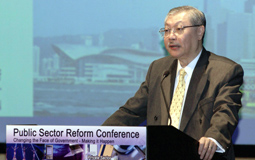
|
| Reform forerunner: Acting Chief Secretary for Administration Michael Suen says the government has to be at the forefront in embracing change and setting the example for others to follow. |
Public sector reform is not just about cutting costs and tackling deficits, acting Chief Secretary Michael Suen says. It's about optimising the use of scarce resources to deliver the best available public services.
Officiating at the opening of the Public Sector Reform Conference at the Hong Kong Convention & Exhibition Centre today, Mr Suen told his audience: "We in government are dedicated to ensuring that the resources entrusted to us are well managed and wisely used. We owe that to the people of Hong Kong."
Gov't must embrace change, set the example
"As a government we need to be at the forefront in embracing change: setting the example for others to follow," he said.
Mr Suen noted that since August 2002, more than 200 initiatives have been put in place, covering a range of government activities. However, he noted that it is a continuous process.
"We recognise the need to address issues related to budget deficits. The Financial Secretary has set targets for balancing the budget and for limiting the proportion of GDP spending on public services. We have frozen the recruitment of civil servants and we have introduced staff-reduction targets designed to bring us back to the staffing levels of a decade ago," he said.
"We also face growing community expectations of enhanced service quality and accountability. We must meet the challenges and advantages presented by the further opening up of trade, tourism and immigration in the Mainland. And we must respond to community concerns about employment, education, and livelihood issues.
"All this means we must seize opportunities to innovate and to change the way in which public services are delivered.
Blueprint for reforms defined
"We are defining a blueprint for those changes and institutional reforms. This blueprint consists of four major elements: managing people and organisations; financial management; harnessing technology and private-sector involvement."
Mr Suen noted that in managing people and resources, we must look for increased flexibility.
"Individuals and departments must both accept that we cannot just do things in a certain manner because that is the way it has always been done. We need to empower more; to encourage initiative and reward performance; and give line managers the right to manage," he stressed.
While financial management must be based on knowing and controlling the full costs of all projects and programmes, Mr Suen said more convenient electronic access to Government services should be provided so as to provide better service and see that back-office operations are efficient and cost-effective.
Good progress seen in outsourcing
Mr Suen also noted that good progress has been made in private-sector involvement in the delivery of public services, as the number of outsourcing activities has doubled over the last two years.
"We are currently pursuing a number of privatisation and public/private partnership opportunities. Such opportunities are mutually beneficial. They ensure the government remains small and benefits from private- sector innovation and management," he added.
|